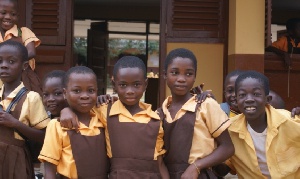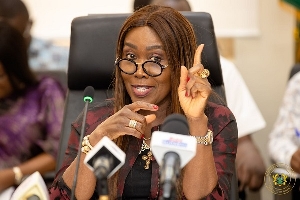- Home - News
- TWI News | TV
- Polls
- Year In Review
- News Archive
- Crime & Punishment
- Politics
- Regional
- Editorial
- Health
- Ghanaians Abroad
- Tabloid
- Africa
- Religion
- Election 2020
- Coronavirus
- News Videos | TV
- Photo Archives
- News Headlines
- Press Release
Opinions of Thursday, 16 November 2017
Columnist: Alex Blege
Defying the odds
There’re two factors that impede the success of the girl child – teenage pregnancy and child marriage. It becomes serious when the girl child grows up in a rural area.
Selina, a twenty year old senior high school leaver of the Hilla Liman Senior High School is determined to break the vicious cycle of poverty that surrounds her.
She was born, raised and still lives with her parents in Gurimuni – a rural farming community which is about 11 kilometres from the municipal capital Wa, Upper West Region.
Due to her inability to make good grades at her first sitting in school she is now attending a remedial school in Wa. She rides her bicycle 11 kilometers from Gurimuni to Wa and back – isn’t that determination?
For nine years, from primary school until she completed the junior high school, she walked 6 kilometres from Gurimuni to Kpongu. Selina, at age 13 travelled to Akumadan, Ashanti Region to work as a farm hand during school holidays and then on two other occasions until she completed the senior high school.
On each of these occasions she comes home with some amount of money: the first time she earned sixty Ghana cedis (GHS60.00), then one hundred and forty Ghana cedis (GHS140.00) and two hundred and fifty Ghana cedis (GHS250.00).
The phenomenon of girls travelling on holidays to work on farms in the Brong Ahafo and Ashanti Regions of Ghana is no new phenomenon; however, the phenomenon makes these girls vulnerable to various circumstances that impede their progress in life.
Among a group of five friends, Selina is the only one among her peers who is still determined to go beyond – four of these girls had fallen by the way side to teenage pregnancy and child marriage – two factors that hinder the progress of the rural girl child.
In an interview with Mr. Kanton, Chief Executive Officer, Community Development Alliance (CDA) – a grassroot development non-governmental organisation in Wa , he states that the above factors: teenage pregnancy and child marriage are prevalent in the rural communities of the Wa Municipality and the other districts. He adds that, these issues are topical at District, and Municipal Annual Health Reviews in the Upper West Region.
In a UNICEF Ghana newsletter, “Really Simple Stats” Issue 4, July 2015 edition, it’s recorded that “In Ghana, 1 in 4 women (27%) married before the age of 18. Child Marriage has increased nationwide from 25.9% in 2006 to 27% in 2011.
The Upper East Region has the highest child marriage rate (39.2%), followed by Western region (36.7) and Upper West region (36.3%). It adds that: “between 2006 and 2011, the following regions have seen considerable increase in prevalence: Easter Region (+ 6.6%), Central Region (+8.3%) and Western Region (+ 9.3%).
Obviously, the above information states that the phenomenon is nationwide. It’s important to ask: what has been the root cause? According to the Newsletter, teenage pregnancy is both a cause and a consequence of child marriage in Ghana – a situation that Mr. Kanton describes as a sad reality.
This sad reality raises the issue of the paradox of social protection in Ghana and whether Ghana can achieve Goal five of the Sustainable Development Goals (SDG) 5, “achieve gender equality and empower all women and girls and its accompanied target SDG 5 (c) adopt and strengthen sound policies and enforceable legislation for the promotion of gender equality and the empowerment of all women and girls at all levels”.
It’s a paradox. There’s a national policy on Social Protection and a Ministry responsible for Social protection, there’re agencies and departments that have been established by the state to pursue social protection; however, the problems that impede the success of the rural girl child still prevails.
Mr. Kanton mentioned two challenges that create a paradox of social protection in Ghana: the lack of the political will and commitment, and little or no budgetary allocation available to the responsible ministries, departments and agencies.
How then can we claim to be pursuing social protection that will result in social justice when there is no political will and commitment, and there’s little or no budgetary allocation for the responsible ministries, agencies and departments?
The responsible ministries, agencies and departments – national to district levels must be resourced adequately to ensure every girl child across the length and breadth of this country enjoys true social justice. Consequently, it will reduce teenage pregnancy and child marriage.
Entertainment










